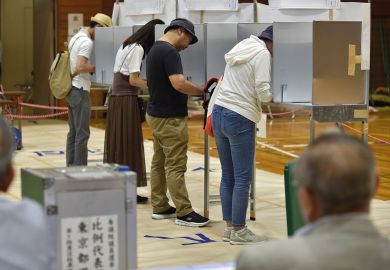Japan is set to incentivise private universities failing to reach enrolment targets to shut down or merge by increasing subsidies to those that do, as part of a record spending plan for the country.
In a draft budget approved by the Cabinet, an additional ¥100 million (£515,000) has been allocated to subsidise private universities, but the government has emphasised the need to reform the sector, which is struggling to enrol new students as the country’s birth rate declines.
According to projections, the number of students entering Japanese universities by 2040 could fall by about 130,000 compared with 2022 levels. Last year, an estimated 59 per cent of private universities failed to meet their enrolment targets as a result of these dwindling numbers.
In the latest budget, Japanese prime minister Shigeru Ishiba has doubled down on his party’s determination to shrink the sector, which consisted of about 615 institutions in 2020.
Government subsidies to private universities, which account for around 10 per cent of these institutions’ budgets, face further reviews in future, while Tokyo has committed to “structural transformation through strategic integration, downsizing and withdrawal of universities”.
The government will also focus on “supporting management reforms” including university mergers and the reorganisation of faculties.
Struggling private universities have been given a deadline to address enrolment issues before the government intervenes further. From 2026, universities whose enrolment rates do not meet targets will be required to formulate a “management reform plan” in order to receive government subsidies.
Subsidies will be increased to those private universities that “improve management efficiency” through mergers, as well as those that respond to local needs.
Mergers have already taken place in the public sector – most notably, between the Tokyo Institute of Technology and Tokyo Medical and Dental University to form Science Tokyo last year.
Tokyo is also pressing ahead with plans to make university free for students from large families. The policy, first outlined in 2023, will be implemented from the 2025 fiscal year.
All students from families with three or more children will be eligible, regardless of their household income, in a plan meant to mitigate the effects of population decline on higher education.
Public university funding will remain at the same level of ¥1.1 billion yen, despite claims from the sector that funding cuts and high inflation are pushing institutions to crisis levels.
An additional ¥1.9 billion has been allocated to shift resources to graduate schools and to support internationalisation and industry-academia collaboration, with details of such initiatives yet to be confirmed.
The full ¥115.5 trillion budget has been submitted to parliament for deliberation.
Register to continue
Why register?
- Registration is free and only takes a moment
- Once registered, you can read 3 articles a month
- Sign up for our newsletter
Subscribe
Or subscribe for unlimited access to:
- Unlimited access to news, views, insights & reviews
- Digital editions
- Digital access to THE’s university and college rankings analysis
Already registered or a current subscriber?








